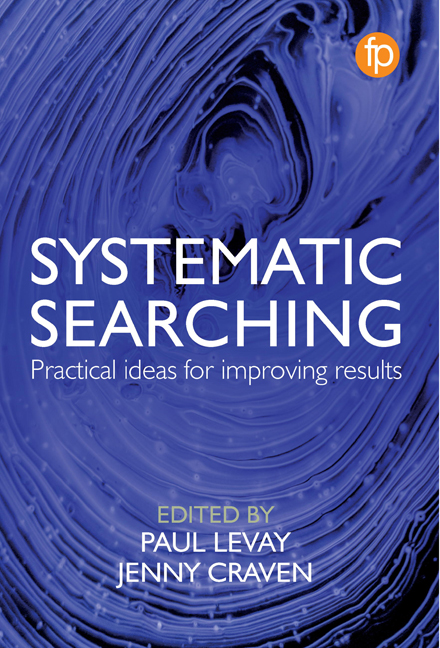Book contents
- Frontmatter
- Contents
- Figures, tables and case studies
- Contributors
- Acknowledgements
- Abbreviations
- Foreword
- 1 Introduction: where are we now?
- 2 Innovative approaches to systematic reviewing
- 3 Searching for broad-based topics
- 4 Choosing the right databases and search techniques
- 5 Gathering evidence from grey literature and unpublished data
- 6 Social media as a source of evidence
- 7 Text mining for information specialists
- 8 Using linked data for evidence synthesis
- 9 Evidence surveillance to keep up to date with new research
- 10 Training the next generation of information specialists
- 11 Collaborative working to improve searching
- 12 Communication for information specialists
- 13 The information specialist as an expert searcher
- 14 Conclusion: where do we go from here?
- Glossary
- Index
6 - Social media as a source of evidence
Published online by Cambridge University Press: 08 June 2019
- Frontmatter
- Contents
- Figures, tables and case studies
- Contributors
- Acknowledgements
- Abbreviations
- Foreword
- 1 Introduction: where are we now?
- 2 Innovative approaches to systematic reviewing
- 3 Searching for broad-based topics
- 4 Choosing the right databases and search techniques
- 5 Gathering evidence from grey literature and unpublished data
- 6 Social media as a source of evidence
- 7 Text mining for information specialists
- 8 Using linked data for evidence synthesis
- 9 Evidence surveillance to keep up to date with new research
- 10 Training the next generation of information specialists
- 11 Collaborative working to improve searching
- 12 Communication for information specialists
- 13 The information specialist as an expert searcher
- 14 Conclusion: where do we go from here?
- Glossary
- Index
Summary
Introduction
The internet has transformed the way in which we search for information and interactive Web 2.0 internet-based applications, such as social media, have advanced the way we use the internet. So, what do we mean by social media? A commonly used definition is that social media are any web-based computer-mediated tools to co-create, share or exchange information, ideas, pictures or videos in virtual communities and networks (such as message boards, social networks, patient forums, Twitter, blogs and Facebook) (Obar and Wildman, 2015). Estimates indicate that there are 3.58 billion internet users (Statista, 2018a) and 2.46 billion social media users worldwide (Statista, 2018b). In 2017, 66% of adults aged 16 and over in Great Britain and 69% of the public in the USA used the internet for some type of social media (such as Facebook or Twitter) and the trend is for the proportion of social network users to increase further (Office for National Statistics, 2017; Pew Research Center, 2018).
Facebook and Twitter may be the most widely known but there are a multitude of other social media networks, each with a different focus. For instance, while some sites aim to connect people (professionally or socially), others are platforms to share news, ideas or information (either with generic or a topic-specific focus to the site). Some social media sites are completely open to the public, others require logins or have privacy restrictions and some social media sites allow both private and public information (for instance through changing the settings). The format of posts also varies from text, images or videos and in some instances may be limited by size (either by characters or file size).
Social media are used to discuss a wide range of issues and views from hobbies and interests to trivia and politics. An increasingly common use of social media, however, is to discuss health issues. Patients often now use social media as a source for information on their health condition, to share their experiences and to find social support. In 2015, 80% of internet users in the USA searched online for health information and 34% read someone else's commentary about health or medical issues (Fox, 2011). In Great Britain, 53% of adults aged 16 and over used the internet for looking for health-related information within the last three months (Office for National Statistics, 2017).
- Type
- Chapter
- Information
- Systematic SearchingPractical ideas for improving results, pp. 125 - 146Publisher: FacetPrint publication year: 2018



